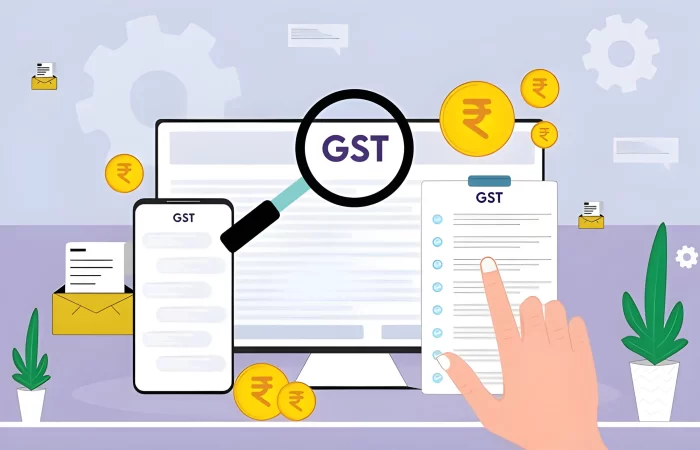
Why 70% of Businesses Struggle with GST Returns (And How to Fix It)
Managing Goods and Services Tax (GST) compliance is a crucial yet complex responsibility for businesses in India. With ever-changing regulations and intricate filing processes, GST return filing often becomes a daunting task. Research indicates that over 70% of businesses struggle with it, leading to penalties, compliance issues, and missed opportunities for input tax credits. But why is this happening, and what can businesses do to overcome these challenges? Let’s delve deeper into the reasons and explore practical solutions.
Common Challenges Businesses Face with GST Returns
1. Lack of Awareness and Expertise
One of the leading causes of GST-related difficulties is the lack of understanding of tax laws. For many small and medium enterprises (SMEs), keeping up with frequent regulatory changes is overwhelming. GST laws require precise knowledge to navigate the nuances of tax codes, deadlines, and procedures.
2. Errors in Data Entry
Accurate data entry is the backbone of successful GST return filing. Yet, businesses often struggle with compiling and reconciling invoices, which can lead to mismatches in the GST portal. Even minor discrepancies can cause returns to be rejected or flagged for scrutiny, disrupting the workflow.
3. Inadequate Technology and Tools
Many businesses still rely on manual processes or outdated accounting systems, making GST compliance inefficient. Modern software solutions simplify the filing process by automating calculations, reconciliations, and updates. However, adopting these tools remains a challenge for organizations unfamiliar with their benefits.
4. Time Management Issues
Filing GST returns on time requires disciplined processes and constant monitoring. Businesses with limited resources often prioritize core operations over compliance, resulting in missed deadlines and late fees.
5. Complex Filing Procedures
The GST return filing process varies based on the type of business, turnover, and GST scheme. Multiple forms such as GSTR-1, GSTR-3B, and annual returns must be filled accurately. Without professional guidance, navigating these forms becomes an uphill task.
Consequences of Ineffective GST Return Filing
The repercussions of improper GST compliance extend beyond monetary penalties. Repeated non-compliance can lead to the suspension of GST registration, legal complications, and loss of credibility in the market. Furthermore, businesses may forfeit input tax credits, affecting their financial health.
How to Simplify GST Return Filing: Key Strategies
1. Leverage the Expertise of Professionals
Engaging GST return filing consultants is one of the most effective ways to ensure compliance. Professionals bring specialized knowledge, handle intricate calculations, and stay updated with legal amendments. Their expertise reduces errors and simplifies the filing process.
2. Automate with Advanced Tools
Investing in cloud-based accounting and tax software can significantly improve efficiency. These tools automate data entry, generate error-free reports, and remind businesses of upcoming deadlines. By integrating these solutions into their workflow, businesses can focus on their core operations without worrying about compliance.
3. Establish a Robust Workflow
Developing a structured system for tracking invoices and reconciling accounts ensures timely compliance. Businesses can designate specific personnel or departments to handle GST tasks, creating accountability within the organization.
4. Stay Informed and Updated
Regular training sessions and workshops on GST can equip business owners and employees with the necessary skills and knowledge. Being proactive in understanding legal changes reduces dependency on external help and promotes confidence in handling compliance independently.
5. Plan Finances Effectively
Setting aside funds for taxes and compliance-related expenses can prevent financial strain during filing periods. Budgeting for penalties, if any, also ensures that cash flow remains unaffected in case of unforeseen delays.
The Role of Technology in Revolutionizing GST Filing
Technology has transformed how businesses manage GST compliance. Automated platforms are becoming the go-to solutions for both large enterprises and SMEs. These systems not only streamline filing processes but also provide real-time analytics, helping businesses identify patterns and discrepancies. By adopting these tools, businesses can mitigate errors, save time, and improve overall efficiency.
Struggling with GST returns doesn’t have to be a norm for businesses. The challenges are real, but so are the solutions. By adopting the right tools, seeking professional guidance, and staying informed, businesses can turn GST compliance from a liability into a strength. The journey toward seamless GST return filing may seem daunting, but with the right strategies, it’s entirely achievable.
For businesses aiming to overcome GST challenges, Shah Doshi offers expert solutions tailored to your needs. Our team of seasoned professionals ensures error-free compliance, allowing you to focus on growing your business without worrying about tax complexities. Visit Shah Doshi to explore our comprehensive GST services today.



